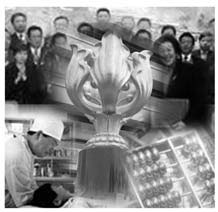HK must preserve the best
Updated: 2007-10-30 07:25

"Adopting a new mindset" has become a catch phrase in Hong Kong after it was given special mention by Chief Executive Donald Tsang in his policy speech earlier this month in the Legislative Council.
Tsang's comments have most certainly added momentum to the on-going search by economic planners, politicians and business leaders for new directions to ensure Hong Kong's relevance in the rapid development on the mainland. The outcome of their combined efforts is expected to have a far-reaching impact on the future of Hong Kong as an international financial center in the region.
In our fervent pursuit of innovative ideas that could lead to fundamental changes in our economic priorities, we must always bear in mind that there are certain elements in our system that need to be preserved with the greatest of care. These basic elements of Hong Kong's success include an independent judiciary, a low and simple tax regime and a well-established healthcare system that provides adequate and affordable medical service to all citizens.
To be sure, there is always room for improvement in any one of these areas. Legal reform has been an on-going process for several years. Ways to broaden our tax base are being explored, and a new financing scheme to bankroll the city's ballooning healthcare bill will soon be proposed.
But the fundamental principles that underline the most critical components of our system should never be tampered with no matter what changes we may introduce to ensure Hong Kong's competitiveness in the fast changing economic environment around us.

Although it is widely recognized that an independent judiciary is the bedrock on which our free market economy is built, not everyone understands how fragile the system could be. To prevail, the Hong Kong judiciary needs to not only dispense justice transparently, fairly, equitably and without undue delays, but also to be seen by the public to be doing so.
For that reason, the rituals and practices that accompany court proceedings should not be easily dispensed with. Some politicians have argued that there is no apparent reason for judges and lawyers to appear in court donning wigs and gowns. But these seemingly impractical practices are symbolic of the system whose survival is so much dependent on the trust and respect of the people in its capacity to serve justice.
In contrast, the Hong Kong tax system is singularly devoid of any drama. It is simple, straightforward and, as some economists would like to say, absolutely neutral. Every now and then, politicians representing different special interest groups call for tax incentives of one form or another to promote their favorite industries or projects. So far, the government has wisely stuck to the basic formula of taxation although the tax base is widely deemed to be too narrow to cope with the projected expenditure of a highly developed economy.
The government has invited public discussion on ways to broaden the tax base. Purists would argue that any new tax must pass the litmus test for neutrality. Its sole purpose must be to raise revenue for the public coffers. But public opinion seems to favor taxes that are tied to environmental protection.
The challenge facing Hong Kong's healthcare system seems a lot more complicated because it touches the lives of so many people. The crude approach of making the user pay, favored by some business school academics, is deemed both intellectually objectionable and socially unacceptable. Hong Kong has a long tradition of ensuring that the best possible healthcare is made accessible to all citizens. Hong Kong people are not going to settle for anything less.
E-mail:jamesleung@chinadaily.com.cn
(China Daily 10/30/2007 page10)
|
|
|
|
|
|